Although it is available in keyboard form most guys use it as a sound module ..... Has all the features of the Triton, although the drum sounds are more full and suited more to R&B and Hip Hop ... The bass sounds likewise. The pianos are particularly good - as are the strings. A little tricky to use to it's full capacity but once you learn the manual [essential to get the most out of it] then it is a doddle. Extremely powerful .... 4 individual outputs and can accept 16 channels of midi.
Kurtsweil
PC2R
 Kurtsweil PC2R:
Kurtsweil PC2R:
The favorite sound module for orchestral work .... Any track that uses 'real' sounds will benefit from the Kurtsweil. Massively powerful and much sought after. Used a lot for film orchestral work ... Particularly Imax film work.

Akai
Samplers
 Akai Samplers:
Akai Samplers:
Still the
favorite for quick instant samples ... Whack in the disc or on the hard drive select the group of sounds [say, your
favorite Hip Hop drum set] and you are up and running immediately .... When the mix is finished, just make sure to save the sounds as a set for that track ... I.D. [identify] the disc or the entry on the Hard Drive and those sounds are saved forever .... Always double save for safety. Keep a file on your PC with a library of all sample sounds used and where they are stored. I still use floppy discs [thousands of them!] ... I have them I.D.'d accurately and entered in the library in the 'Samples' file on my P.C. When I want a particular sample I simply open the file ... Go to 'edit' in the toolbar then go to 'find' ... Enter the sample name or the title of the track and ... Quick as a flash ... There is the sample disc I.D. .. I then go to the store of samples and as they are all stored properly in order it is easy to find ... Pop it in the Akai and we are ready to go ... In minutes! By the way, I have two separate stores ... Two identical copies ... One lot marked 'A' and one lot marked 'B'. Simple...eh?
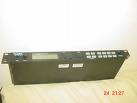
Alesis DM5:
 Alesis DM5:
Alesis DM5:
The favourite drum sound module ... Easy to use, stunning, instant sounds and you can layer the sounds with others from the Motif or the Akai sampler. Scoffed at by those who never have success ... used in most successful studios. Also used in live concert situations with triggered drums [my band drummer uses Alesis in our concert rig ... all over the world!]. So simple .... Use any hired in drum kit ... Stick on the triggers .... Voile! We have the original sound of the drums for any of our Hit tracks immediately ... No tuning, no time lost! No hassle! No confrontation with the sound engineer.
 So how do
you use this gear?
So how do
you use this gear?
The best combination [and this is what I use] is Triton as a main 'mother keyboard' using the first 16 channels of Midi [I use four to eight normally and leave the rest for other sound modules used for special sounds].... The Motif as an additional sound module using the next 16 midi channels [sometimes called 'B' midi] and also using Midi Channel 10 as the basic drum Midi channel. I also use this second set of midi channels for the 8 that are available through my Akai samplers.
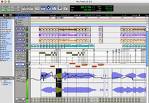
Protools
 Protools
Protools
I use Protools specifically as a sound recording unit and a midi sequencer. So all the live sounds, voices, guitars, maybe bass and sometimes drums [if they add to the occasion] ....I always run the midi stuff 'live' when mixing although if I am using a particularly hard to capture midi generated sound, I will record that in audio on Protools.
This, I find is the best way of working [for me!] ... It is what I grew up with and feel comfortable with.
Remember, there
is Protools and there are the rest!

Soundcraft
 Soundcraft
Soundcraft
I like the convenience of the whole mix presented on my analogue mixing desks .... 24 channel Soundcraft for the main stuff and 16 channel Studiomaster for the drums, percussion and noise samples.
I could use the all singing all dancing computerized
desks but I like the feel of a 'proper' desk under
my fingers.

16
Channel Studiomaster
 16
Channel Studiomaster
16
Channel Studiomaster
I find that the benefit of working like this is that I can have a stereo compressor strapped [inserted] over the entire 16 channel Studiomaster mix ... Which is presented into the Soundcraft on two group faders. ... The voices are presented over six channels and the rest of the 'music' mix are presented over other group faders.
So, when mixing, the Protools auto mix will take care of the internal mix of the vocals, guitars etc. and I simply manually adjust the mix between the drums, live stuff, and music. This gives me a feeling of satisfaction when I mix as I feel it has my personal stamp on it.
==============
Of course, the final touch to any studio is the monitoring:

Yamaha
NS10S
 Yamaha
NS10S
Yamaha
NS10S
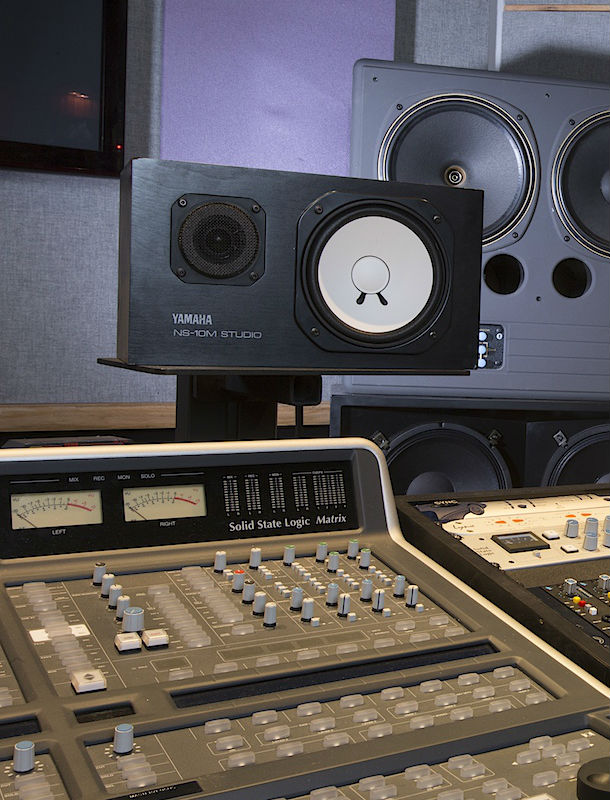 Picture By Ohconfucius
Picture By Ohconfucius
The essential near field monitors ... Used in every studio in the world ... Scoffed at by unsuccessful music makers and loved by all successful producers and studio owners ... Hard to find, since they have been discontinued, but worth the search. [Studiospares do a 'look-alike' version which they claim have the same sound ... I have recommended them to members and have never had a complaint]
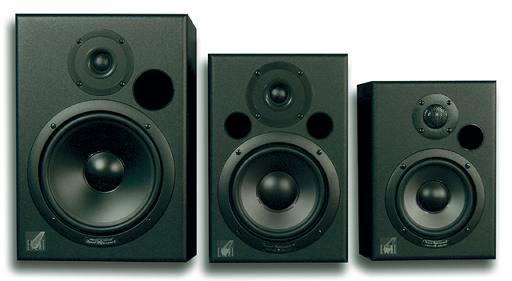
Event
TR Monitors
'Event' main monitors:
Although not in every studio, they are the best I have ever heard.
At the price! I like to hear my mixes on a
variety of speakers .... I use the NS10s for mixing,
then listen on my KEF Corelli Hi Fi Speakers to
tell me what the mix will sound like in a home Hi
Fi situation and then I listen 'in full
technicolour' on my purpose built Nightfire studio
monitors [awesome!]
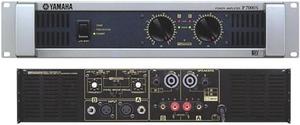
Yamaha
Power Amp.
 Yamaha
Power Amp.
Yamaha
Power Amp.
The most powerful monitor amp you can afford ... I use Yamaha 1 Kwatt ...[yes, 1,000 watts] . Preferably get one that doesn't rely on a cooling fan, which will be a nuisance while recording through a live mic. .. As will the cooling fans on the computer tower .... Make sure the tower is in a separate room to the recording space.
==============
 Neumann ... the best? I wonder!
Neumann ... the best? I wonder!
 Microphones:
Microphones:
Purely your own choice ... Don't be overawed by 'brand names' ... I have heard the worst vocals recorded through top of the range Neumann mics. Simply because no one has them serviced and they can be twenty or even forty years old! Think what the innards must look like?
I have also heard some of the best recordings done
with cheap and cheerful mics.
Check 'em out
before you buy ... a good shop will let you take a
range to your home studio to A/B/C test them.
Read the specs. carefully and pay particular note to the noise floor level [the inherent noise of the mic. with reference to the amount of volume intake it will accept.. Called signal to noise level]
Check out my friend Ian Warrener's mics. http://www.pa-direct.co.uk/pdf/microphones.pdf
It is far more important to ensure that your recording space is totally dead sounding before you even think about auditioning mics. Cheap to achieve if you are on a budget .... Look at 'Home Studio - The Best You Can Get' ...
http://www.makehits.co.uk/art019.htm for excellent sound deadening and sound proofing advice.
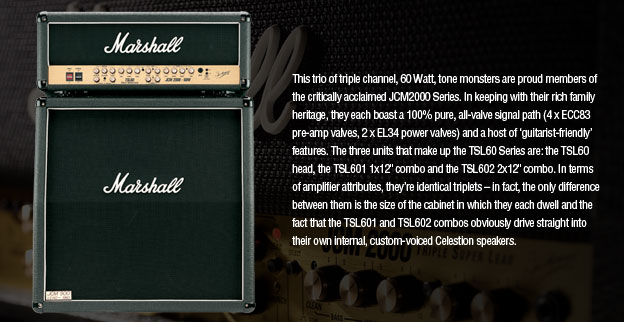
 Guitar Equipment:
Guitar Equipment:
There is only one equipment you should use and that is Marshall .... Preferably the guitar module Marshall JMP1.

This module will emulate all the great Marshall amps through the years and you can plug it into your recording gear in stereo. So, you don't annoy the neighbours ... Or 'the one who must be obeyed' who is downstairs watching her favourite soap. Simply put on your earphones ... Grab your guitar ... And you sound like Carlos Santana...right?
There is a very interesting guide to Marshall Amps ....
An updated, comprehensive guide on how to choose Marshall amps on our sister site, Beginner Guitar HQ. It is completely free and you can find it here: https://beginnerguitarhq.com/best-marshall-amplifiers/
 Martin, Gibson, Taylor
... the best?
Martin, Gibson, Taylor
... the best?
 Acoustic guitar recording
Acoustic guitar recording
This is best
described at: 'The Best Way to Record Guitar' http://www.makehits.co.uk/art013.htm
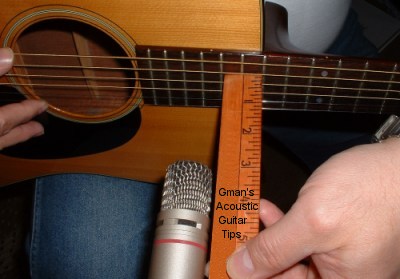
Do
we need to be this precise? I don't think so -
The
Best Studio?

The best studio, to
my mind, is the smallest that will accommodate what you want to
record. A brass band or a string orchestra will need a large room,
with a separate control room and quite bright [brittle, echoing]
acoustics ... preferably with large in built sheets that can be reversed
or angled to alter the acoustics.
For
small live bands, it is a good idea to have a separate small room for
the drums and another small room for a vocalist or lead guitar player.
For
90% of home recording, where the tracks are recorded individually, the
open small room is best... where earphones can be used by all those
recording at the same time....altogether the best and most convenient
'today' way of recording.
So
what are the main rules?
Beware
of......
1) Hums
from the equipment
2)
Hums from the computer tower fans
3)
Creaking chairs [I mean that!!!!!]
4)
Monitor speakers left on while recording [you would be surprised how
many times this happens]
-
Also,
have the room as dead as possible, with no parallel walls [the
reflection can cause unwanted reverberation]. Always have
sheets of hardwood available so that you can physically and quickly
change the acoustics of the room .... a few large mirrors can be
magical in changing the ambient sound.
How
can you improve the sound?
 It is important to understand that there is
no piece of equipment yet made that can make any ungigged, inexperienced
voice sound better. We can make a great voice sound fantastic
...but we cannot make a silk purse out of a pig's ear...as my mother
used to say. I give the best method for 'training' a voice to make
great potential hit records in 'How
to Make a $Million From your Music'.
It is important to understand that there is
no piece of equipment yet made that can make any ungigged, inexperienced
voice sound better. We can make a great voice sound fantastic
...but we cannot make a silk purse out of a pig's ear...as my mother
used to say. I give the best method for 'training' a voice to make
great potential hit records in 'How
to Make a $Million From your Music'.
It
is also the same for any 'played' instrument ...say, guitar,
piano. Yes - we can adjust the timing and the sound, but we cannot
actually create the great flowing lines and great flowing thought in the
music.
Yes, there
are synths around that can orchestrate in real time ... but they have no
place in today's hit music world.
|
Always remember that no one will ever
know where your great masterpiece was
recorded ... just like no one knows
exactly where the Mona Lisa was painted
or under what conditions.
You
can call your studio by any name ...
only you will know the truth!
|
BEWARE:
Never, ever
think that automated synth music can make a hit
... or... that music made with one synth [unless
the individual lines are recorded on Pro Tools
track by track] can sound like a hit record.
| The
idea for this article was from songwriting
and music making members
of The Serious Writers Guild. It
gives an idea of the benefits of
belonging to the Guild. You can
join simply by purchasing the ten month
programme 'How to Make A $Million From
Your Music' at www.makehits.co.uk/swgappsecure.htm |
References:
This Article was
written by Dec Cluskey
Email a question?
contact@makehits.com
The best reference book for all contacts is 'Uncle
Dec's Lil' Instruction Book - Vol II'
CLICK HER
|
Become a Member of
the 'The Serious Writers Guild' CLICK
HERE
When you get involved
with DEC you get the first program: "How To Make A
$Million From your Music" - ten months of two knowledge
packed books a month, stunning advice, today's methods
for writing music, making music and promoting it. 24/7
access to the man himself. And you get a 'LIFETIME'
guarantee.
If you ever pay DEC
for anything, if you are not happy at anytime in your
life with the product then return it for a complete,
no-quibble, courteous refund! DEC means it!
That's not only a
guarantee it's a personal promise
"There Is No Catch"
"There Is No Risk"
Become a Member of the
'The Serious Writers Guild' CLICK
HERE |
| This
guarantee does not affect your statutory
rights |
|
|